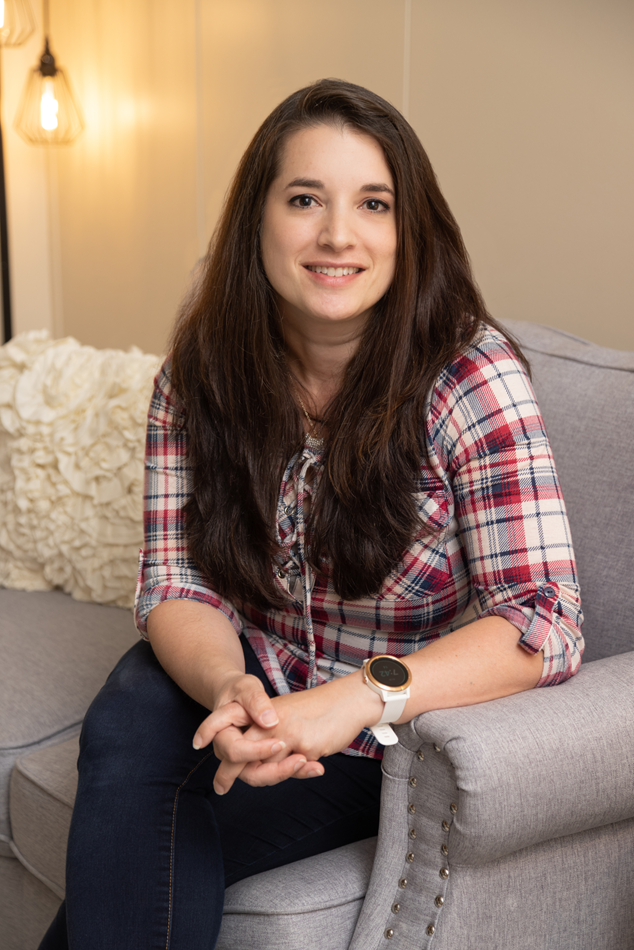About Anna

Anna Slaydon, MA, LCMHC
Anna Slaydon (she/her) is a LCMHC with Greater Hope Center. She is the Founder and Executive Director of Greater Hope Counseling Inc PC.
Anna specializes in the treatment of Obsessive Compulsive Disorders (OCD) and related disorders, including Obsessive Compulsive Personality Disorder (OCPD), Body-focused repetitive behaviors, Specific Phobias, Hoarding, and Panic. She is a Certified EXRP(ERP) professional, certified by Cognitive Behavioral Institute.
Why select Anna for your OCD disorder treatment?
Anna is passionately committed to providing quality care for OCD and related disorders. She is a member of the International OCD Foundation and frequently participates in education and collaboration with OCD experts around the world. She has been treating OCD as a specialist for many years and over 90% of her clients have a diagnosis of OCD or related disorder. Treatment modalities she may incorporate in your treatment includes Exposure Response Prevention Therapy (ERP or ERPT), Acceptance and Commitment Therapy (ACT), Cognitive Behavioral Therapy (CBT), Comprehensive Behavioral (ComB) Treatment, and Metacognitive Therapy (MCT).
FAQ
Anna’s Response: Cognitive Behavioral Institute’s EXRP certification is awarded to individuals who have demonstrated strong foundational skill in EXRP through consultation. Consultees must demonstrate core competencies in the key domains of EXRP during the 32 weeks. EXRP certification indicates to consumers, potential employers, and other clinicians that I am skilled in EXRP therapy and is evidence of my expertise in the use of EXRP treatment.
- Expanding the Horizons of OCD Treatment with Social Skills Training (IOCDF)
- When ERP Comes up Short: Strategies for Managing Stubborn OCD Symptoms (IOCDF)
- Ask Jon Anything; The Nature of OCD, Psychological Treatments, and Future Directions (IOCDF)
- Autoimmune OCD Subtype: immunological Causes – What Clinicians and Patients Need to Know (IOCDF)
- Broadening our Understanding of the Genetics of OCD (IOCDF)
- Co-occurring Autism Spectrum and Obsessive-Compulsive Disorder: Clinical Considerations (IOCDF)
- Dying to Know! Treatment and Recovery with Suicidal OCD, a Personal and Provider Account (IOCDF)
- Intensive Exposure and Response Prevention: Who, What, Where, When, Why and How (IOCDF)
- Mapping OCD: Leveraging network analysis to inform treatment precision and personalization for OCRDs (IOCDF)
- OCD and Pornography: A Complex Relationship Explored (IOCDF)
- Tales of the C(omorbid)ity: Exploring the Dynamic Features of Co-Occurring OCD and PTSD (IOCDF)
The Perfect Problem: The Overlap Between Perfectionism and OCD – and What To Do About It (IOCDF) - Understanding the Mechanisms of Change in Inference-based Cognitive-Behavioral Therapy (IOCDF)
- How to How to work with a Client’s Perfectionism (National Institute for Clinical Application of Behavioral Medicine)
- Inference-based Cognitive Behavioral Therapy (Cognitive Behavioral Institute)
- Therapy Interfering Behaviors when Conducting ERP: Therapists have them too! (IOCDF)
- Function over Form: Helping Patients Live their Lives when Treatment FEels Stuck (IOCDF)
- Medication and Neuromodulation Treatments for Obsessive-Compulsive Disorder (IOCDF)
- Treating Disgust-based Contamination OCD (IOCDF)
- Applying Inhibitory Learning Theory to Exposure THerapy for OCD (IOCDF)
- Putting the “C” back in CBT for OCD (IOCDF)
- Acceptance and Commitment Therapy (ACT): Theory and Practice (Cognitive Behavioral Institute)
- Habit Reversal Training for Skin-Picking and Hair-Pulling (Cognitive Behavioral Institute)
- Exposure Based CBT for Social Anxiety Disorder (Cognitive Behavioral Institute)
- Treating Obsessive Compulsive Disorder (OCD) in Children and Adolescents (Cognitive Behavioral Institute)
- ERPT for OCD (Cognitive Behavior Institute)
- CBT for Body Dysmorphic Disorder: An Introductory Course (Massachusetts General Hospital Psychiatry Academy)
- Is It OCD?: Untangling OCD from Common Differential Diagnoses (IOCDF)
- Brief Intensive OCD Treatment: Support, Implementation, & Considerations (IOCDF)
- You, Me and Relationship OCD: Diagnosis, Treatment and Intimacy with rOCD (IOCDF)
- Two Geeks Nerding Out on Metacognitive Approaches to Treating OCD (IOCDF)
- Case Consultation Roundtable: Integrating ACT & ERP in the Treatment of OCD (IOCDF)
- The Heart of Exposures OCD and Depression: Clinical Treatment Implications and Recommendations for Adolescents: Compassion-Focused ACT for OCD and Trauma-Related Distress (IOCDF)
- OCD and Depression: Clinical Treatment Implications and Recommendations for Adolescents (IOCDF)
- Assessment and Treatment Considerations in Comorbid OCD and Psychosis (IOCDF)
- Coping Skills for a Stressful World: The Use of Out-of-Session Activities to Promote Healing (ACA)
- Creative and Expressive Arts: Tools for Counselors (ACA)
- Current Trends and Topics in Ethics: A Discussion Panel With the ACA Ethics Committee (ACA)
- So, you’re a new ERP Therapist (IOCDF/NBCC)
- Obstacles to the Treatment of OCD and BDD (IOCDF/NBCC)
- Specialized Treatment of Complex OCD and BDD. An international perspective (IOCDF/NBCC)
- What to do when Traditional Outpatient Therapy Isn’t enough: Navigating next steps (IOCDF/NBCC)
- Helping clients with religious scrupulosity (IOCDF/NBCC)
- Helping clients with religious scrupulosity engage treatment (IOCDF/NBCC)
- OCD Psychiatrist 101 (IOCDF/NBCC)
- All In Due Time: Personal Retrospectives on Treatment Response (IOCDF/NBCC)
- We’re Only Human: Common Therapist Missteps in ERP and How to Correct Them (IOCDF/NBCC)
- Imaginal Exposures 101 (IOCDF/NBCC)
- The Tea on DBT (and how it can sweeten ERP) (IOCDF/NBCC)
- Response Prevention Strategies (IOCDF/NBCC)
- Don’t Believe Everything you Think! Shifting Perspectives on Intrusive Thoughts in OCD and Anxiety (IOCDF/NBCC)
- Treatment of OCD and BDD in Athletes: Tips for Athletes, Their Parents, and Their Therapists (IOCDF/NBCC)
- Creative Treatment Augmentation in Private Practice (IOCDF/NBCC)
Anna’s Response: I am so sorry that happened to you! Treating OCD is a specialty. Think of this like the difference between the doctor you see when you have a cold vs. a Cardiologist. Your doctor can listen to your heart and help you with heart care decisions at a certain level – but a Cardiologist can provide a much higher level of heart care. Treating OCD works the same way. A general therapists can help, but an OCD therapist has a higher level of education, more tools and resources, and can utilize treatment modalities that are unique to this class of conditions. In short: My toolbox is a lot bigger! OCD is a treatable condition and I am confident in my ability to provide you exceptional care.
Anna’s Response: The role of medication must be considered on a case by case basis. Medication is a tool to consider, but may not be the right tool for all clients. I will educate you on how medication may fit into treatment, but it will ultimately be up to you. If you choose to pursue medication, I will work closely with your prescriber to ensure quality, wrap-around care. If you do not have a preferred provider, I can provide recommendations for providers that I have worked with in the past and observed a high competency around the unique needs of your condition.
Anna’s Reponse: Clients must be physically within the state of North Carolina at the time of the appointment. If you are enrolled in our intensive outpatient care program and would like recommendations about local temporary housing options, please let us know.
Anna’s Reponse: Absolutely! It’s common for clients to bring loved ones to session, particularly the first session. We can also include your loved ones into treatment to help educate them on how to best support you.
Anna’s Reponse: It’s common for OCD to present in ways that make us feel afraid or ashamed. Sexual themed obsessions are extremely common with OCD and many of my clients experience them in some way. This includes obsessions about family members, children, and animals. I have a lot of experience working in this area and do not feel uncomfortable talking about it. I promise – I don’t even flinch! It is important that you get quality care. Please don’t let this get in the way of your wellness journey.
Let's begin the work, together.
Led by vision, grounded in compassion—that’s what defines our team. Whether you felt a connection with Anna’s thoughtful approach or were inspired by the mission at the heart of our leadership, click below to schedule your appointment.
